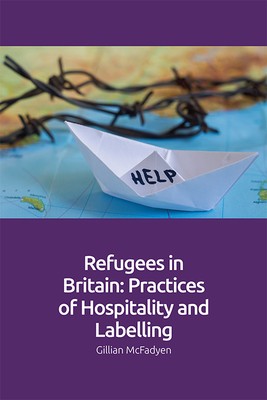
- We will send in 10–14 business days.
- Author: Gillian McFadyen
- Publisher: Edinburgh University Press
- ISBN-10: 1474447171
- ISBN-13: 9781474447171
- Format: 14 x 21.6 x 1 cm, softcover
- Language: English
- SAVE -10% with code: EXTRA
Reviews
Description
An empirical examination of contemporary refugee practices in Britain
- Innovative theoretical framework, weaving for the first time together the theories of hospitality and labeling and applying them to the refugee regime
- Expansion of the theoretical framework of hospitality, with development towards an understanding of externalized humanitarian hospitality
- Research underpinned by rich empirical material- 34 interviews and 30+years of archival research on government framing of the refugee
- Offers three, empirically grounded, case studies on the British asylum system from the national, regional and grass-roots level.
This book provides a multi-faceted way of assessing the British approach to refuge on local, state and regional levels, by intertwining the theories of hospitality and labelling before applying them to the study of refugees. This novel method of looking at the British refugee regime allows for deeper insights into the notions of power, identification, responsibility, language and externalisation of refugee politics.
The book argues that the British refugee regime has developed towards an externalised humanitarian hospitality whereby the practice is geographically projected beyond the territorial confines of the state in order to both control and exclude the refugee. In tandem, the book also engages with counter-discourses by examining local practices of British hospitality and showing acts of solidarity that challenge the statist logic. The result is a theoretically informed account of the British approach to externalisation and geographical seclusion of refugees, particularly in response to the current Mediterranean Crisis.
EXTRA 10 % discount with code: EXTRA
The promotion ends in 8d.05:30:25
The discount code is valid when purchasing from 10 €. Discounts do not stack.
- Author: Gillian McFadyen
- Publisher: Edinburgh University Press
- ISBN-10: 1474447171
- ISBN-13: 9781474447171
- Format: 14 x 21.6 x 1 cm, softcover
- Language: English English
An empirical examination of contemporary refugee practices in Britain
- Innovative theoretical framework, weaving for the first time together the theories of hospitality and labeling and applying them to the refugee regime
- Expansion of the theoretical framework of hospitality, with development towards an understanding of externalized humanitarian hospitality
- Research underpinned by rich empirical material- 34 interviews and 30+years of archival research on government framing of the refugee
- Offers three, empirically grounded, case studies on the British asylum system from the national, regional and grass-roots level.
This book provides a multi-faceted way of assessing the British approach to refuge on local, state and regional levels, by intertwining the theories of hospitality and labelling before applying them to the study of refugees. This novel method of looking at the British refugee regime allows for deeper insights into the notions of power, identification, responsibility, language and externalisation of refugee politics.
The book argues that the British refugee regime has developed towards an externalised humanitarian hospitality whereby the practice is geographically projected beyond the territorial confines of the state in order to both control and exclude the refugee. In tandem, the book also engages with counter-discourses by examining local practices of British hospitality and showing acts of solidarity that challenge the statist logic. The result is a theoretically informed account of the British approach to externalisation and geographical seclusion of refugees, particularly in response to the current Mediterranean Crisis.


Reviews